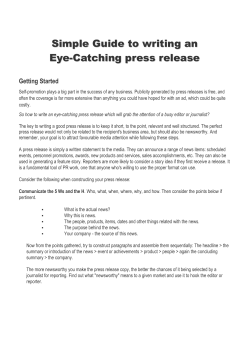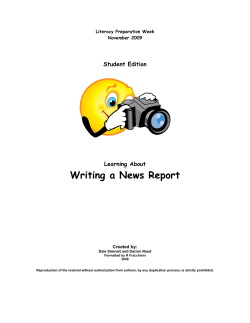
THAT WAS THE WEEK THAT WAS
Monday December 9th, 2013 UNDERSTANDING THE LONGWAVE ECONOMIC AND FINANCIAL CYCLE THAT WAS THE WEEK THAT WAS Monday, December 9th Front Page Headline, New York Times – “EADS Announces 5,800 Job Layoffs as Military Budgets Reduced. European Aeronautics Defense and Space – the parent company of Airbus – announces plans to lay off 5,800 employees from its military and space MONDAY, DECEMBER 9TH divisions over the next three years, as it responds to cuts in European military budgets driven by austerity measures. The widely anticipated staff cuts, which affect 4,500 permanent and 1,300 temporary workers represent about 5% of EADS’ global workforce of 133,000 employees.” Workers protest potential job cuts recently outside the EADS plant in Bremen. Source: Getty Images • The Economy Ministry in Berlin reports German industrial production – adjusted for seasonal swings – declined by 1.2% in October from a revised 0.7% drop in September, citing a decline in manufacturing output of 1.1% and a drop in durable goods production of 3%. Carsten Brzeski, an economist at ING Groep NV in Brussels commented: “The German economy did not have an overwhelming start to the 4th. quarter that (business) confidence indicators had suggested.” • Front Page Headline, Financial Post – “Quebec Alleges Kitco Metals Among a Dozen Gold Trading Firms Accused of Tax Fraud. Revenu-Quebec is seeking prison sentences and fines totaling $750 million (CAD) for Kitco Metals Founder Bart Kitner and company directors, together with 11 other gold trading firms. Revenu-Quebec spokesman Stephane Dion asserted: ‘The Department has filed a total of 1,920 charges against Kitco Metals Inc. and 11 other companies – as well as their directors and an accountant – implicated in an alleged fraud scheme linked to gold processing. Some 120 charges were filed against Kitco and another 120 against Mr. Kitner, involving total fines of $454.6 million (CAD). The total amount allegedly derailed by all 12 companies charged is $350 million (CAD) over a twoyear period ending in 2010. This is an investigation that’s lasted several years and the evidence is significant. Without a doubt, it’s one of the largest investigations in Quebec Provincial history.’ While the Department claims that Kitco specifically made false statements and attempted to obtain tax rebates to which it wasn’t entitled, Kitco forcefully denies the allegations. Last year, Kitco filed a lawsuit against Revenu-Quebec seeking $122 million (CAD) in damages caused to the company. Today, Kitco stated: ‘Our legal action against the Department will escalate as a result of the formal charges. Mr. Kitner believes that RevenuQuebec’s continuous pursuit of this case is not only an abuse of the Department’s authority, but also, has caused substantial harm to Kitco’s ongoing operations and development. Kitco continues to vigorously contest all aspects of the Department’s actions.” Monday December 9th, 2013 TUESDAY, DECEMBER 10TH • Kitco Metals Inc. Founder Bart Kitner. Source: Postmedia News • Front Page Headline, Bloomberg News – “U.S. Budget Agreement Reduces Spending Cuts Over Two Years. Breaking a three year cycle of fiscal standoffs, Congressional budget negotiators unveiled a bipartisan agreement to reduce automatic spending cuts – known as the sequester – by about $63 billion (U.S.) over two years, while reducing the federal deficit by $23 billion (U.S.). Senator Patty Murray and House Representative Paul Ryan announced: ‘The budget compromise not only, avoids a government shutdown when funding authority expires on January 15th., but also, provides an assist to the domestic economy, which has suffered some damage due to a series of fiscal feuds.’ Zero Hedge reports the number of employees across the firms of the broadly based Russell 2000 Equity Index has collapsed by more than half from its peak in 2001. In the same period, the value of that index has risen by 137%. See chart below. Senator Patty Murray and Rep. Paul Ryan. Source: Bloomberg Source: Bloomberg Monday December 9th, 2013 the former Federal Reserve Chairman and approved today by five regulators – could cut as much as $10 billion (U.S.) in annual pretax profits from the eight largest American banks through lower revenues and higher compliance costs. The 953-page edict, part of the 2010 Dodd-Frank financial overhaul, codifies and restricts the way banks trade securities. The ruling curbs banks’ ability to invest their capital and forces them to segregate client trades from the so-called proprietary trades. Mr. Volcker informed the WSJ today that ‘the rule will help the stability of the broader economy by restoring trust and confidence in banks.” The bipartisan budget plan – which will be considered by the Republican-controlled House later this week – would set U.S. federal spending at $1.01 trillion (U.S.) for the current fiscal year, higher than the $967 billion (U.S.) required in a 2011 budget accord. The agreement sets spending for defense at $520.5 billion (U.S.) and for non-defense at $491.8 billion (U.S.). President Barack Obama called the agreement ‘a good first step’ towards a compromise that will meet some of his goals for spending priorities.” • Front Page Headline, Globe and Mail – “Kellogg’s Ontario Plant Closing / a Casualty of Changing Tastes. Kellogg Co. is adding its name to a growing list of American companies closing plants in Ontario, as its London factory becomes a victim of changing consumer appetites. The Michigan-based food processor will close the 89-year old facility as part of a four-year global retooling that will also include an Australian snack factory closing. The demise of the London plant, which employs about 550 people and makes ready-to-eat cereals Corn Flakes, All-Bran and Muslix underscore the stiff challenges facing parts of Canada’s manufacturing industry. The big concern in Ontario is the spillover effects from a plant’s closing, since the whole supply chain – from agriculture to services – suffers a blow. Ken Wong, a business strategy professor at Queen’s University in Kingston, Ontario, stated: ‘It’s difficult for large companies to quickly retrofit plants to suit changing consumer habits. While Canada used to have an edge with its skilled work force and an ability to produce value-added goods, some of that skill can now be handled through automation. Moreover, consumer tastes are shifting towards more natural and organic cereals – a lucrative market – and away from traditional high-sugar cereals that are mass-produced. In an era of childhood obesity and diabetes, the highly sugared cereals have become much less popular.” • Front Page Headline, Globe and Mail – “Canadian Governments Increase Job Layoffs at Record Pace. According to the research of Benjamin Reitzes at BMO Nesbitt Burns: ‘Restraint at all levels of government has hit the public labour market hard. With the federal government and most provinces still looking to balance their books, don’t expect a (hiring) comeback anytime soon. Indeed, Canadian public sector employment declined by a record 5.3% in November on a year over year basis, amounting to 52,000 jobs.” • Front Page Headline, Wall Street Journal – Volcker Rule Challenges Wall Street. A broad new government rule to limit risk taking by Wall Street banks will force them to rethink virtually every aspect of their trading activities. According to estimates by Standard and Poor’s, the new ruling – named for Paul Volcker, U.S. President Obama congratulates former Fed Chairman Paul Volcker. Source: New York Times • Front Page Headline, Infowars.com – “Italian Riot Police Remove Helmets and Join Anti-EU Protesters. The demonstrators are an eclectic amalgamation of Italians, from truckers to students. The origin of the protests stems from the ‘Pitchfork Movement’ which began as a group of Sicilian farmers pushing for reforms, but grew into a nationwide revolt against banks, the Italian tax collection agency Equitalia, the European Union and the Socialist-backed minority government, which is moving to privatize higher education. Euronews reports: ‘Many share the protesters’ anger and at one point police officers in Turin removed their helmets in a show of solidarity.’ In a television interview, Giorgio Bissoli, a spokesman for the Azione Rurale protest group in the Veneto region declared: ‘We farmers are on the streets to say ‘Enough!’ to the state, the government and the unions. We just can’t manage anymore. Our main priority is that they all must go.’ Discontent over fuel prices, globalization and the European Union’s draconian austerity measures are also expected to lead to a huge anti-EU backlash in next year’s European Parliamentary elections … Italian youth unemployment exceeds 40% as the country remains embroiled in a deep recession. A staggering 134 retail outlets in Italy are closed every day and business failures have increased by 10% since last year alone. Police removing their riot gear and joining with protesters is slowly becoming a refreshing social trend. On a Monday December 9th, 2013 cost $1 (CAD), up 59% from the current price of 63 cents (CAD). Separately, Finance Canada announced it will exempt the postal service from making special payments to its employee pension plan, which has a deficit of $6.5 billion (CAD).” historical scale, police joining in solidarity with protesters is often a precursor to massive social change, such as before the fall of the Berlin Wall, or the removal of the Romanian dictator Nicolae Ceausescu.” WEDNESDAY, DECEMBER 11TH • Front Page Headline, Bloomberg News – “Canada Post to Phase Out Home Delivery. Ottawa-based Canada Post announced it will not only increase the cost of stamps by as much as 59% beginning in 2014, but also, it will be laying off as many as 8,000 workers over the next five years, in order to offset declining mail volume. In a statement which outlined steps to reduce costs by up to $900 million (CAD), the agency elaborated: ‘With the increasing use of digital communication and the historic decline in letter mail volumes, Canada Post has begun to record substantial financial losses. If left unchecked, continued losses would soon jeopardize its financial self-sufficiency and become a significant burden on taxpayers.’ Canada is joining countries such as the U.S. and the U.K. in attempting to cut the cost of government-operated postal services amid declining volumes of letter mail. An April report by the Conference Board of Canada estimated the government-owned agency will lose nearly $1 billion (CAD) annually by 2020, unless it changes its way of doing business. Effective March 31, 2014, an individual stamp will • Front Page Headline, Mineweb – “Junior vs. Senior – Mining Discovery Performance in Charts. In a recent presentation, Richard Schodde at Minex Consulting drew a striking picture of the performance of juniors and seniors in mineral exploration in Canada and abroad. It is worthwhile to share a few of his graphs (with his permission) which draw a clear picture of the importance of juniors in the Canadian exploration scene. The summary statistic is this: since 1960, juniors spent about $61 billion (CAD) on exploration in Canada – 36% of the total amount spent on exploration – and made about 45% of the total discoveries. Over recent decades, it’s apparent that junior exploration spending has skyrocketed, a fact that can be partly attributed to the increasing power of the personal computer. Beginning in the 1980s, bare bones companies could compete with the majors in the exploration game and discoveries followed the money During recent decades, we see that juniors made many of Canada’s discoveries, indeed, most of them in the past 10 years. However, exploration is often a fruitless task. Companies spend money and find nothing and this is evident in Schodde’s overall Monday December 9th, 2013 ratio of total exploration dollars spent to the value of discoveries. For juniors, this was 0.89. Typically, it’s the rare major discoveries which make for massive returns (though not only). This is evident in the next graph where Tier 1 discoveries – big ones – drive Schodde’s estimates of discovery value far above what was spent. Over the past decade, juniors have ruled this roost (yellow bars = value created, red line = spending) making most of the big discoveries. Monday December 9th, 2013 Metal prices dominate the exploration cycle in Schodde’s analysis (although there other contributing factors) and he extrapolates future exploration expenditures in a variety of gold price scenarios. His general sentiment is that the sky isn’t falling. Taking $1,200 (U.S.) per ounce gold, he forecasts exploration spending to average about $1.3 billion (CAD) a year in Canada in the coming years. While that’s much lower than the banner year of 2012, historically speaking, it’s still quite a healthy level.” young people. This is not what the (EU) founding fathers promised.’ The Cypriot-British economist – who won the Nobel Prize in 2010 – reflecting upon the reason why he had worked so diligently to persuade Cyprus to join the EMU in 2008 explained: ‘Back then, the euro looked like a great idea (to me). However, the EU has now backfired. It is restraining (economic) growth and job creation; as well as dividing Europe. The present situation is (simply) untenable.” THURSDAY, DECEMBER 12TH FRIDAY, DECEMBER 13TH • The Labor Department reports U.S. initial claims for state unemployment benefits increased by 68,000 to 368,000 in the week ended December 7th. while continuing claims rose by 40,000 to 2.79 million in the week ended November 30th. The number of Americans who have exhausted their traditional benefits and are now receiving emergency or extended benefits under federal programs declined by about 102,000 to 1.25 million in the week ended November 23rd. • The Commerce Department reports U.S. retail sales rose by 0.7% in November – the most in 5 months – citing higher automobile sales and more product discounts available to consumers at the start of the holiday season. Joseph LaVorgna, an economist at Deutsche Bank Securities in New York, commented: “Consumers are getting a tailwind from lower gas prices and higher (household) wealth through equities and real estate.” • Eurostat reports euro zone industrial output declined by 1.1% in October, the second consecutive month of decline and the steepest drop since September 2012. The drop in industrial output was led by a 4% decline in the energy sector; followed by a 2.4% drop in consumer durables output and a 1.3% decline in the output of capital goods. • Front Page Headline, Daily Telegraph U.K. – “Dismantle the Euro: Nobel Prize Winning Economist. According to the Daily Mail, Sir Christopher Pissarides – a professor at the London School of Economics – in a lecture delivered today accused ‘the European Monetary Union (EMU) of dividing Europe (to the extent) that action is now required to restore the euro’s credibility in international markets … The EMU should either be dismantled in an orderly way, or as quickly as possible; the leading members should take the necessary initiative to make the European Union (EU) growth and employment friendly. The EU will get nowhere plodding along with the current line of inconsistent debt relief policies and an ad hoc decision making process. The policies (being) pursued now to steady the euro are (not only) costing the EU jobs, (but also) creating a lost generation of educated • Front Page Headline, Globe and Mail – “California’s Troubles Are on Every Corner. In an op-ed, Globe reporter Gary Mason writes: People are literally freezing to death in California. Over the past couple of weeks, freezing temperatures have spelled doom for many who live on Bay Area streets, as at least seven people have died from hypothermia. There are an estimated six thousand homeless in San Francisco on any given night, with only 1,339 shelter beds. It’s impossible to walk anywhere in the downtown core without encountering these poor souls; their mangled, damaged feet, peeking out from beneath filthy blankets. In the meantime, only blocks away, the rich fill the lobby of the Westin St. Francis Hotel and pack the aisles of Macy’s; onepercenters seemingly oblivious to the grinding poverty around them. While California may still possess enviable temperatures for most of the year, beyond the palm trees and warm breezes lurks a world of trouble. Jerry Brown has returned as governor to clean up the mess left behind by his predecessor, Arnold Schwarzenegger, whose tenure in office was volatile. Many have called California a failed state and with some reason. From the high poverty rate to decaying infrastructure, many years of neglect have taken a toll. Roads have suffered as a result of years of deferred maintenance. According to Forbes magazine, California leads the United States in many categories, none of them good: highest taxes, lowest bond rating, highest poverty rate, tied for highest unemployment rate, poorest state in which to do business and most cities which have declared bankruptcy. The state’s prison system is so badly managed that its operation had to be assumed by a federal judge. The traffic congestion is probably the country’s worst. A severe water crisis also exists, as droughts are now common. Worse still, are the many small communities whose ground water has been contaminated by chemicals used for agriculture, which have leached into the water table. In the meantime, the state’s education system remains chronically troubled, in large part due to a hyper-polarized and endemically dysfunctional political system. Other than the sun, it is difficult to see a bright spot on the horizon. Monday December 9th, 2013 According to the Los Angeles Times, California is legally bound to pay billions of dollars it avoided paying everyone from schools to health care providers while it attempted to balance its books. As the L.A. Times reported, Mr. Brown’s budget addressed only a small portion of the state’s overall debt responsibilities. This is where the numbers become really scary. The Department of Finance has reported that California’s debt was reduced to less than $28 billion (U.S.). However, that doesn’t include government employee pension and health benefits which have been promised, but not funded. Stanford University estimates that the state’s unfunded pension liabilities total as much as $497 billion (U.S.). Meanwhile a report by the Pew Center suggests that unfunded state retiree liabilities are $77 billion (U.S.) and growing. Most observers agree that until California deals with these two areas, it will only be pecking away at its monstrous fiscal challenges. It’s difficult to imagine state legislators not having to deliver some extremely unpleasant news to tens of thousands of government employees in the coming years. Despite its financial woes, California continues to talk about a high-speed rail line between Los Angeles and San Francisco which would cost tens of billions of dollars. On another front, the state has ruled against allowing fracking for oil and gas despite having the largest shale deposits in the country. Many believe that this one move alone could have helped release California from the grips of financial despair … Indeed, the state’s problems are deep-seated and becoming clearly visible. In point of fact, the shivering evidence can be found on almost any street corner.” • Front Page Headline, Daily Telegraph U.K. – “BoE Governor Mark Carney Warns of Threat from Shadow Banking in Emerging Markets. The shadow banking sector – estimated to total $67 trillion (U.S.) in 2011 – includes hedge funds and finance companies, or securities entities which provide credit or credit guarantees without being regulated like a bank. During a conference organized by the French Economy and Finance Ministry, Bank of England Governor Mark Carney warned: ‘At the moment, the biggest risks (to global financial stability) are in the parallel banking sector in emerging markets. Not only are reforms required in developed countries, but also, in the emerging markets … Moreover, the new regulatory framework must be designed to ensure that financial markets can handle the collapse of a bank. It forces us – and we will do this next year – to come to an agreement on the capital structures that ensure bank shareholders and certain classes of debt holders are next in line, well in front of taxpayers. An essential element on that reform will be to agree on the amount and location structure of the bailin-debt for systemic institutions. This will be the key to unlocking this issue.” Bank of England Governor Mark Carney. Source: Reuters • Front Page Headline, Daily Telegraph U.K. – “B of A Urges Clients to Acquire China Default Insurance. The Bank of America has advised clients to take out default insurance against Chinese debt, warning that monetary policy tightening by China’s central bank risks triggering a bout of serious credit risk in 2014. Bin Yao, BofA’s credit strategist in Asia, noted: ‘Chinese bond yields have already risen to the highest level in a decade, as the authorities seek to rein in rampant growth of the M2 money supply and excess credit; yet markets remain complacent about the implications. I recommend buying credit default swaps (CDS) on 5-year Chinese debt as the easiest way to hedge the China tail risk … The markets have underestimated the risk of a (Chinese) monetary squeeze. The Bank of China has already raised (administered) interest rates by 75 basis points over the last year. Rising bond yields are pushing the shadow banking system closer to the brink. We find trust loans especially troubling.’ Short-term debt issuance by Chinese trust companies has increased to $320 billion (U.S.) from virtually zero two years ago. A new study by the China Academy of Financial Research warned that the trusts faced a redemption shock after promising rates of return between 10% to 15% that may be impossible to deliver.” Monday December 9th, 2013 CLOSING LEVELS FOR FRIDAY, DECEMBER 13TH. WEEKLY CHANGE Dow Jones Industrial Average 15,755.36 – 264.84 points Spot Gold Bullion $1,234.60 (U.S.) + $5.60 per oz. S&P / TSX Composite 13, 125.70 – 155.02 points 10-Year U.S. Treasury Yield 2.86% Unchanged Canadian Dollar 94.38 cents (U.S.) + 0.54 cent U.S. Dollar Index Future 80.07 – 0.189 cent WTI Crude Oil Futures $96.60 (U.S.) – $1.05 per barrel Ian A. Gordon, The Long Wave Analyst www.longwavegroup.com Disclaimer : This information is made available by Long Wave Analytics Inc. for information purposes only. This information is not intended to be and should not to be construed as investment advice, and any recommendations that may be contained herein have not been based upon a consideration of the investment objectives, financial situation or particular needs of any specific reader. All readers must obtain expert investment advice before making an investment. Readers must understand that statements regarding future prospects may not be achieved. This information should not be construed as an offer to sell, or solicitation for, or an offer to buy, any securities. The opinions and conclusions contained herein are those of Long Wave Analytics Inc. as of the date hereof and are subject to change without notice. Long Wave Analytics Inc. has made every effort to ensure that the contents have been compiled or derived from sources believed reliable and contain information and opinions, which are accurate and complete. However, Long Wave Analytics Inc. makes no representation or warranty, express or implied, in respect thereof, takes no responsibility for any errors and omissions which may be contained herein, and accepts no liability whatsoever for any loss arising from any use of or reliance on this information. Long Wave Analytics Inc. is under no obligation to update or keep current the information contained herein. The information presented may not be discussed or reproduced without prior written consent. Long Wave Analytics Inc., its affiliates and/or their respective officers, directors or employees may from time to time acquire, hold or sell securities mentioned herein. In addition, the companies referred to herein may pay a fee to Long Wave Analytics Inc. to be listed on www.longwavegroup.com. Copyright © Longwave Group 2013. All Rights Reserved. ”Those who cannot remember the past are condemned to repeat it.” Santayana
© Copyright 2025









